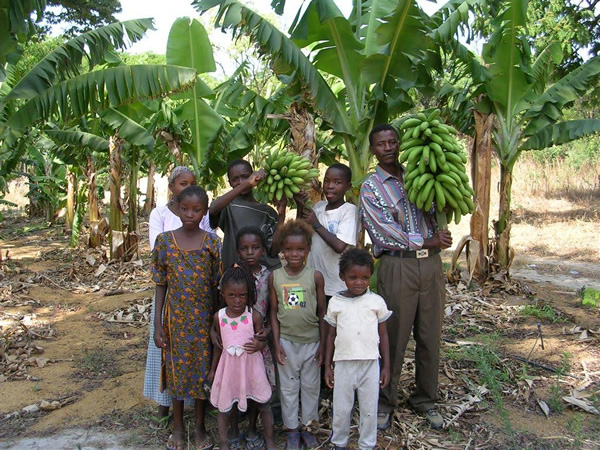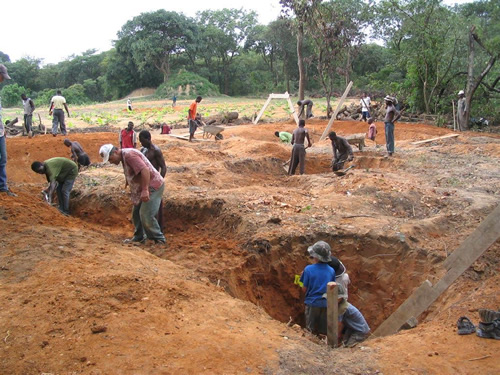Volunteering in Zambia
Sharing Knowledge With Local Farmers and Learning From a New Culture
Article and Photos by Marianne Stamm

|
|
A community in Zambia is proud of their banana harvest.
|
Kitwe, Zambia was not in any of the Rough Guide books for Africa. In fact, I could not find a guide book for Zambia at all. It appeared that we definitely were not headed to one of the main attractions on global tourist route. Wheat farmers from central Alberta, Canada, my husband, me, and another couple from our community had volunteered through our local church to help plan and implement an irrigation system for bananas in Zambia. Heart of Africa Mission is run by local Zambians, with an emphasis on community development. We were there to share our agricultural experience and knowledge with the African farmers.
Zambia, like so many African countries, is a land of diametrical opposites: brilliant colors — flowers, trees, birds, and people — and dark tragedies, including AIDS, malaria, extreme poverty, and hopelessness. Subsistent farmers, often women, plow meager plots with heavy hoes beside expansive fields of irrigated corn and soybeans which would rival any farm in the corn belt of the U.S. Tile covered mansions set in beautiful parks hide behind heavily guarded gates in close proximity to cardboard and plastic covered hovels. Elder mothers in long traditional dresses of brightly colored African prints share the crowded uneven sidewalks with youth in modern jeans and T-shirts. Land Cruisers pass wagons powered by steers. These contrasts never ceased to fascinate.
The four of us left snow-covered Alberta in January. We spent the next four weeks in a steep learning curve — not just about bananas and irrigation systems, but also about a value system that sees time as something fluid, possessions as something you share, and knows little about the pressure to produce things in a certain time period, as we were trying to accomplish in Zambia. Many of our preconceived ideas and deeply held values were challenged.
Working side by side with the local Zambians, we attacked the weeds growing profusely in the fertile red volcanic soil of the young banana plantation. There were no machines in sight, no rototillers, or tractors; just a wheelbarrow and basic hoes. Some of the men had walked long distances to be at work at 7:30 a.m. The workers asked us many questions about life in Canada. They all wanted to come and work on our farms. We told them how cold it was there in January and they shuddered, not so sure they would like it after all. One asked how much my digital camera cost, and I was foolish enough to tell him — the equivalent of six months wages for him. We have since learned to avoid such questions. It only helps to reinforce their ideas of the white man as very rich, which, in comparison to the men we weeded with, is quite true. Through the local workers, we came to realize what life is like for a large part of Zambians. Poverty and hardship now had a face. We visited some of them in their homes, usually very simple places with no water or facilities of any kind. We were humbled by their generous hospitality. They served us mugs of hot sweet tea which Zambians love to drink with four or more teaspoons of sugar, and fried chicken with Nshima (a thick cornmeal mush) — the choice for honored guests. The friendships we began then have deepened as we returned in subsequent years.
The banana plantation would help make the small mission station self-supporting. It would also teach banana farming to the students there. Students would go on to teach others, supplementing their meager means. It has done that and more. Through the jobs created several families now have food, education for their children, and adequate housing. The plantation is producing well and a source of great pride for all who work there.
A year later, returning to help expand the irrigation system, we were met by the African staff and the first thing they asked us was, “Have you seen the bananas?” We had — the lush green jungle was the first thing to meet us. It is a great satisfaction to us all to know we had a small part to play in making a difference in their lives. The difference is just as much in what cannot be measured — the pride, new abilities, and capacity building — as in the economic value of the plantation. We may feel relatively few people were affected, but there is a strong ripple effect as they pass on their new skills and attitudes to their neighbors and children.
My husband worked hard engineering the water reservoir and installing pumps. But the story he tells most often is of the young man that stopped us on one of our walks somewhere. He pointed to his bike, and grinning widely, told Robert, “Thank you, Thank you! It still works.” Robert had repaired it for him. A bike in Zambia is like a truck in North America — vital transportation for people and produce. Robert’s small effort made a big difference in this man's ability to get work.

|
|
Volunteers and locals digging water reservoirs.
|
I feel strongly about sharing our experiences with people back home. We are a global community and this is one way we can help bring about understanding among different cultures. Our local newspaper — which has a wide coverage area — gave me a weekly column so I could write of our experiences while in Africa. We take every opportunity available for presentations in clubs, homes, and churches. Many in our community now have a better appreciation for the joys and needs of some of the people in Zambia
“We sure appreciate your sacrifice,” the missionary often said. For us it was never a sacrifice, only a privilege to have the opportunity to be immersed in a culture and place so far removed from our own, to be able to exchange ideas and thoughts, to have our world views challenged. All this while living in a beautiful tropical country in the lush green of the rainy season while at home in Alberta the snow and cold would cover the landscape for months. No, the volunteer work was never a sacrifice. It was only an honor.
Agriculture Volunteer Work in Developing Countries: How Can You Do It?
-
Many of the large, and smaller, development organizations have agriculturally related projects. Check their websites. Try World Vision and USAID. Often these agencies have links to a variety of other ones.
-
We went through our local church, affiliated with ACOP (Apostolic Church of Pentecost) of Canada. They were looking for farmers to help set up the banana plantation.
-
Check with your local church, college, or service clubs (i.e. Rotary Club). Many are involved with overseas development projects, or have connections to organizations that do.
-
Zambia is full of large and small aid and development organizations. Search the Internet, using keywords like "Agriculture Zambia," or "agriculture development work Zambia," etc.
-
Always research any organization you are interested in working with. Ask for contact information of people who have volunteered with them. You want to make sure you will have a good experience.
-
Check the articles and links on this website.
|
Marianne Stamm is a semi-retired farmer who, while in Africa, writes a regular newspaper column for the local paper. She and her husband are preparing for their fifth trip, again to work with farm cooperatives. Travel with a purpose is very important to Marianne.
|
